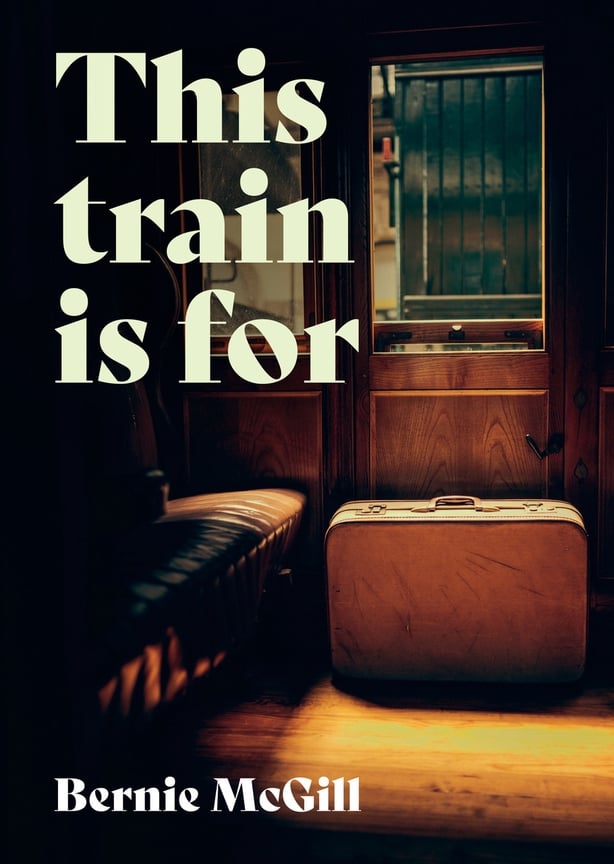We're delighted to present an extract from This Train is For, the new short story collection by Bernie McGill, acclaimed author of The Watch House and The Butterfly Cabinet.
Bernie McGill's award-winning stories have been widely praised for their emotional depth and lyrical language. This new collection, her first since 2013, contains unpublished stories along with a number of previously published stories contained within award winning anthologies.
There is More than One Word
It is late September and the footpaths on Botanic Avenue are treacherous with rain and fallen leaves. Jaynie trundles her suitcase across the road and picks her steps around a puddle at the mouth of a blocked drain close to the kerb. She hears the word 'kerb' in her head and it sounds strange to her. Was that what they had always called it? There was another word, she thinks, from years and years ago, when they used to play ‘Kick the tin’ out in the front street, but whatever it was, it escapes her now.
She has taken a taxi from the airport, but on a whim, has asked the driver to drop her at a café. Deirdre said she’d leave a key out for her; she won’t be back from work for hours. She said she’d phone Jaynie right away if there was any word.
‘Take your pick,’ the driver said. ‘But you needn’t be looking for a sandwich. It’s all wraps and falafels round here these days.’
She searches for the Canterbury & Dyke but it’s gone from the corner of Cromwell Road and when she follows the curve of the street to look for the student flat she’d shared nearly thirty years before, the building is gone as well, replaced by a new apartment block in fresh red brick. The houses to either side retain the arched doorways she remembers, the sash windows crowned with pale coping stones, the narrow brick chimneys with their slim chimney pots. But her old building looks like it has been picked up and shaken, brushed off, wiped clean, put back down, set to rights. She walks back up the road.
She sits at the window of a café on the bridge over the railway line, nursing a cup of tea in her hands and looks out on to the avenue. The rain has stopped. A girl with hair the colour and texture of candy floss strides past. The three men at the table beside her are speaking in a language she doesn’t understand: Eastern European, she thinks, Russian, maybe. A woman at the counter has ordered a takeaway coffee and now she is talking on her phone, explaining to the person on the other end why she is going to be late. It’s because there were so many leaves still on the trees, she is saying, and they’ve blown off with the storm. The trains are all delayed, travelling at no more than thirty miles an hour; some of the lines have completely shut down. At this rate she’d be quicker walking to Ballymena, the woman says. She may have to take the bus. She adds ‘so there are’ at the end of her sentences, or ‘so they have’, or ‘so I would’, reaffirming what it is she’s just said, to herself or to the person she’s calling it’s not clear. There’s a crisis over a child who is due to be collected. Can the other person pick him up? She’s sorry she’s late but it’s beyond her control. Everyone’s late and getting later by the minute. Botanic station is like a frigging wartime evacuation, so it is; she couldn’t take one more announcement about the delays; she’s been standing on the platform for an hour.
Jaynie’d forgotten that people did that here, added linguistic fillers to the end of their sentences. What was that about? A lack of confidence in being believed, even when speaking the truth? For years Jaynie has lived elsewhere, in places where she has had to make herself understood, learn all the words that are acceptable, along with the words that are not. She has become au fait with the nuances of formal address in three different languages, of the pleasures of idiom, the pitfalls of pronunciation, how the wrong stress on a syllable can dangerously alter the meaning of a word. Her own language is thirty years out of date, fossilised in the 1980s, along with sweater dresses and faux gold. She has all the English vocabulary for tape recorders and record players, has had to learn from a distance the language of social media, of online dating, of fake news. She calculates that she has enjoyed an average of three failed relationships per continent. Would she never think of settling down, Deirdre has asked her, like it’s within her gift to make such a choice, like all she has to do is decide.
She has told the principal at her current school that her brother has died, that she needed leave to come home for the funeral. She hasn’t told him that between these two events is a gap of forty-seven years; that she isn’t certain there will be a burial; that she hopes there will, but that she couldn’t say for sure. It was too complicated to get into. She didn’t want to have to explain. Hope isn’t something you associate with death. It’s none of their business anyway.

There is More than One Word is published by No Alibis Press

